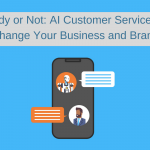AI and Customer Care: The Future is Here

Siri, Alexa, and OK Google… these are the virtual interactions that Sci-Fi movies have portrayed for decades past. The future is, it seems, here at our fingertips. These technologies are sparking new expectations in today’s consumers on an almost daily basis. We want intelligent interactions that are personalized to our own situations and we want them on demand – not after we waste our precious time sitting on hold.
TL;DR: Artificial Intelligence represents a whole new set of tools to add to your customer care workshop. AI can quite literally anticipate the needs of every customer and deliver answers to questions they didn’t even know to ask.
Long gone are the days when customers almost expected to experience IVR hell and would pretty much tolerate jaw-dropping wait times. We’re in a whole new world now and that world is evolving at a rapid rate. IBM reports that by 2020 – that’s just two years away – 85% of all customer service interactions will occur without a human agent. Instead, in addition to self-serve customer service, the majority of interactions will be driven by AI technology. Forget AI being the future of the contact center. AI is the now of the contact center.
What Does AI Customer Service Look Like?
Artificial intelligence in the contact center is one significant piece of the puzzle that is omni-channel customer service. With integration between live chat, video chat, SMS, web forums, email, social, self-serve apps, and, of course, voice, the omni-channel experience must be seamless. Using superior language processing, voice and text recognition, sentiment analysis, and big data analysis, leveraging AI is essential to delivering a fully integrated customer support experience.
Consider that the large majority of customer interactions are currently transactional processes. Password resets, changed addresses, parts ordering, status updates, appointment setting, and more are straightforward calls that can easily be addressed by virtual agents or chatbots. Automating transactional processes through AI tools can help deliver a higher level of responsiveness while driving cost out of the equation.
Furthermore, AI tools, as well as machine learning and business intelligence, can be used to customize interactions like never before. With the help of big data analysis, AI tools can personalize every call, email, live chat, social response, and conversation based on the customer’s prior interactions, preferences, transactions, purchases, browsing habits, and more.
According to a Deloitte study, 33% of contact centers have taken the first steps and plan to invest in AI and robotics in the next two years. For companies in the multimedia and technology industries, 56% plan to implement contact center AI technology in the near future. Here’s why: out of all available contact center tools, AI and chatbots are expected to gain the 3rd highest ROI, after website capabilities and mobile applications.
The same Deloitte study reveals that the biggest hindrance to implementing artificial intelligence in the contact center will be integration with existing systems. At Blue Ocean, we are no stranger to the challenges this presents. Even the best intentions in your technical investments can be thwarted by duplicated processes and inefficiencies that threaten to arise when implementing innovative technologies. Check out our latest case study about our custom integration between a client’s IVR system and cloud-based ticketing system.
Ultimately, however, the ROI on AI in the contact center will be a massive motivator. IBM reports that by 2022, businesses will save approximately $8 billion annually, up from the $20 million dollars saved in 2017. In other words, investing in AI is essential if contact centers want to stay simultaneously cost-effective and competitive.
How Will AI Impact Customer Experience?
But it’s not just about cost savings. The number one priority for almost all contact centers is the customer experience and customer satisfaction. That’s where AI in the contact center once again steals the limelight.
Leveraging big data and machine learning algorithms, AI can quite literally anticipate the needs of every customer and deliver answers to questions they didn’t even know to ask. Furthermore, artificial intelligence tools are free from bias and day-to-day emotional challenges that can impact all of us. Additionally, the seamless omni-channel experience that AI can help support will promote customer satisfaction and loyalty. If you use AI correctly, get ready to see those NPS stats go through the roof.
Of course, AI can’t solve every customer service issue. There will always be complex customer service scenarios that will be (and should be) escalated to human agents. The live agent voice or chat channel can be leveraged as a value-add, representing an opportunity to build a deeper, differentiated relationship with the customer in a world that is all too often transactional. These interactions will require greater insight and an emotional connection that can be fulfilled by live agents where AI may have fallen short. This level of relationship when an issue is escalated will prove to increase customer satisfaction and loyalty.
The Future of AI in the Contact Center
AI is not one “tool” in the customer support toolkit of the future. AI represents a whole new set of tools to add to your customer care workshop. Creating a differentiated strategy for deploying artificial intelligence in tandem with empowered, capable, well-trained agents, integrating it seamlessly into existing systems and infrastructure, and taking advantage of data mining and machine learning to enhance your customer journey should be Job One for every chief customer officer in 2018. If you’re looking for a strategic partner who can get you where you need to be, contact us.
Related Articles
The Evolution of Self-Serve Customer Service
IVR Custom Integration for a Multinational Communications Corporation: A Case Study
Automating Transactional Volume for Multinational IT Corporation: A Case Study



